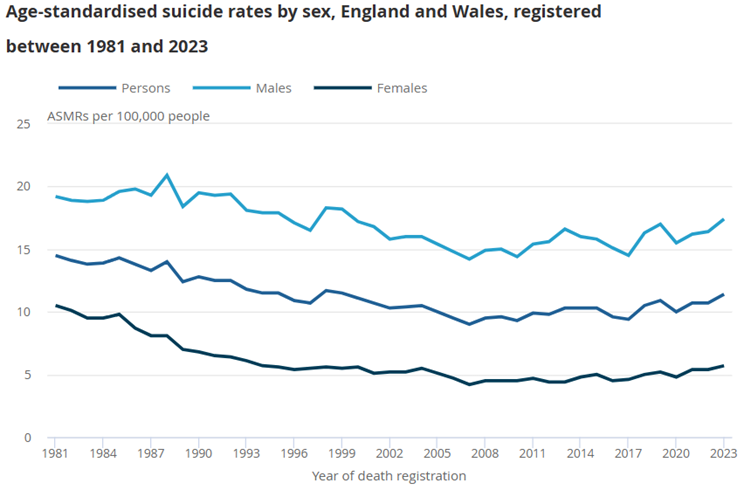Talk about it: Breaking the stigma of suicide
For those having suicidal thoughts, it can be very challenging to reach out for help or to know where to turn – but help is available, suicide is preventable, and simple steps taken within the workplace can make a huge difference.
For those bereaved by suicide, there are often intense and complex feelings of guilt, anger, and confusion. These emotions are rarely linear and can be difficult to process, especially in environments where stigma still exists.
While deaths from suicide are rare in the workplace, when it does happen, the impact on those left behind is enormous.
In 2023, 6,069 suicides were registered in England and Wales, with men aged 45 to 64 the most affected demographic. Many other factors impact suicide incidence rates, however, including sexual orientation, gender identity, socio-economic status and bereavement.
With rates of suicide climbing since the pandemic, this underscores the need for targeted mental health support and suicide prevention.

Source: Office for National Statistics.
It is vital for workplaces to be proactive in offering mental health resources and, in the case of crisis or bereavement, readily respond with empathy and practical support. The difference it makes when someone feels safe to speak, seek help, and grieve, cannot be overstated.
Role of employers
Creating a supportive and informed environment for all employees, treating mental health with the same approach as physical health, reducing stigma, and encouraging employees to engage with available support, should underpin your wellbeing strategy.
Employers can play a vital role (and often with little or no financial outlay) by:
- Establishing a mental health strategy which includes understanding the risk, and ways to mitigate the risk, of suicide.
- Empowering line managers to feel confident in identifying potential risks of suicide, talking to their team compassionately and appropriately about mental health, and where to go for additional support – many organisations offer line manager training.
- Introducing trained mental health first aiders, giving employees a clear path to informed support, and sending an equally clear message that it is ok to seek help.
- Providing on-site crisis support for bereaved colleagues in the event of a suicide.
- Signposting specialist organisations that support those undergoing a mental health crisis, or those who may be affected by suicide loss (please see the end of this article for examples of some available resources).
- Offering webinars and education – there is a wealth of resource available at no charge that you can use to support your employees, from guides for line managers, to resources such as JAAQ (a free to all platform aimed at destigmatising mental health and offering support).
- Providing access to an employee assistance programme (EAP) that offers immediate, confidential support, and can offer services such as on-site crisis support, should the worst happen, as well as providers often offering additional training and support for line managers.
- Making the most of other benefits already in place, for example:
- Group life assurance policies are usually a core element of an employee benefit package, and often offer a wealth of resources around suicide prevention and bereavement support as part of their added value services.
- Group Income Protection providers often offer early intervention support for mental health conditions alongside other added value benefits.
- Occupational Health services can offer confidential advice and support for staff from trained clinical specialists
- Private medical insurance may offer mental health support, and also added value services which can support ongoing wellbeing.
- Communicating what is available – having support in place is a good first step, but it is wasted if employees aren’t aware of it. Make mental health a key aspect of your ongoing comms programme; consider including a specific area on your intranet, regular reminders on what is available, and ensuring that signposting is easily found.
- Reviewing bereavement policies to ensure that they are appropriate, recognise the unique challenges of suicide loss, and include signposting to support such as practical, legal and financial support (often via the EAP) as well as guidelines around time off etc.
- Consider partnering with a suicide prevention or mental health organisation as your chosen charity for regular fundraising.
Conclusion
The key message is that suicide is preventable and rare, but when it occurs, the loss is not just a personal tragedy, it’s a workplace issue, and one where employers can make a real impact.
For those who have lived through suicidal thoughts or experienced bereavement from suicide, the presence or absence of support can shape the outcome significantly.
Support services
You will likely have many resources available through your employee benefits offering, but there are also many essential resources run by charities which provide excellent support and interventions at no cost, that you may well also want to signpost to, depending on the circumstances.
Resources for all
| Resource | What do they do? | Availability | Telephone services | Online services |
|---|---|---|---|---|
| Emergency services | Support in a life threatening emergency from the ambulance, fire, or police services | 24 hours a day, 7 days a week | 999 | n/a |
| NHS | Official NHS line where mental health professionals will support you | 24 hours a day, 7 days a week | Call 111, select Option 2 | Check your mental health systems with the online triage here: Check your mental health symptoms - NHS 111 |
| The Samaritans | The Samaritans are on the end of the phone for you, whatever you are going through | 24 hours a day, 7 days a week | Call 116 123 |
Email [email protected] for a reply within 24 hours. |
| Shout | Free & confidential 24/7 mental health text service | 24 hours a day, 7 days a week |
Text "SHOUT" to 85258 Text "YM" to 85258 if you're under 19 |
Find out more at: https://giveusashout.org/ |
| National Suicide Prevention Helpline UK | A compassionate and understanding lifeline for those grappling with their mental well-being or thoughts of suicide. | 6 pm to midnight, 7 days a week | Call 0800 587 0800 | Find out more at: https://spuk.org.uk/ |
| SANEline | National out of hours mental health helpline offering specialist emotional support, guidance and information to anyone affected by mental illness | 4 pm to 10 pm, 7 days a week | Call 0300 304 7000 | Find out more at: https://www.sane.org.uk/ |
|
JAAQ (Just Ask Any Question) |
Ask any question on mental health, and hear real stories from real people with either clinical expertise, or lived experience | 24 hours a day, 7 days a week | n/a | Find out more at: https://jaaq.app/home |
Specific support for men’s mental health
| Resource | What do they do? | Availability | Telephone services | Onlines services |
| Campaign Against Living Miserably (CALM) | CALM is a suicide prevention charity on a mission to help people end their misery, not their lives. CALM is there If someone is struggling and needs to talk. | 5 pm to midnight, 7 days a week |
Call 0800 58 58 58 WhatsApp service also available |
Webchat service available. |
| Andy’s Man Club | A men’s suicide prevention charity, offering free to attend peer-to-peer support groups across the United Kingdom and online | Groups meet on Mondays at 7 pm (except for bank holidays) | n/a | Find your closest group and more information at: https://andysmanclub.co.uk/ |
| James' Place | Offer free, life-saving support to men in suicidal crisis in Liverpool, London and Newcastle by providing quick and free access to non-residential therapy and support. | 9.30 am -5.30 pm Monday to Friday excluding bank holidays |
London: 020 3488 8404 Liverpool: 0151 303 5757 Newcastle: 0191 406 6000 |
Find out more at: https://www.jamesplace.org.uk/ |
Support for younger people in crisis
| Resource | What do they do? | Availability | Telephone services | Online services |
|---|---|---|---|---|
| Childline | A free, private and confidential service where you can talk about anything. For anyone under 19. | 24 hours a day, 7 days a week | Call 0800 11 11 (this will not appear on the phone bill) |
Create an account to send email or have a 1-2-1 chat with a counsellor. Find out more at: https://www.childline.org.uk/ |
| The Mix | Web information, support groups, discussion boards, and short term counselling for young people aged 13 to 25. | Website resources available 24/7 | n/a | Find out more at: https://www.themix.org.uk/ |
| Papyrus HopeLine | Charity dedicated to prevention of suicide and promotion of positive mental health and emotional wellbeing in young people under the age of 35. | 24 hours a day, 7 days a week | Call 0800 068 4141 | Find out more at: https://www.papyrus-uk.org/ |
Support for friends and family and those who have experienced suicide loss
| Resource | What do they do? | Availability | Telephone services | Online services |
|---|---|---|---|---|
| SANEline | National out of hours mental health helpline offering specialist emotional support, guidance and information to anyone affected by mental illness, including family, friends, and carers | 4 pm to 10 pm, 7 days a week | Call 0300 304 7000 | Find out more at: https://www.sane.org.uk/ |
| Survivors of Bereavement by Suicide (SOBS) | SOBS provides peer-led support for adults impacted by suicide loss through face-to-face groups across the UK, a national helpline, and online forums. | 9 am to 7 pm, 7 days a week | Call 0300 111 5065 | Find out more at: https://uksobs.com/ |
| Winston’s Wish | Childhood bereavement charity that supports young people 25 and under after the death of a parent or sibling. Services include counselling, practical guidance for caregivers, and resources for schools and employers |
Telephone Helpline 8am to 8pm weekdays (excluding Bank Holidays) Text & WhatsApp service (aged 13+) 3 pm to 8 pm, weekdays |
Call 08088 020 021 Text or WhatsApp on 07418 341 800 |
Live Chat 8am and 8pm, weekdays (excluding Bank Holidays). Find out more at: https://winstonswish.org/ |
| Facing the Future | A joint initiative by Samaritans and Cruse Bereavement Support, offering free, online, six-week support groups for adults bereaved by suicide. | Times vary by group | n/a | Find out more and register at: https://www.facingthefuturegroups.org/ |
This list is not exhaustive and is accurate at time of publishing. Inclusion should not be taken as a recommendation or endorsement of these services. Services are available to UK residents.
Supplied by REBA Associate Member, Gallagher
Gallagher is a global, integrated HR consulting, benefits administration & technology services provider.








